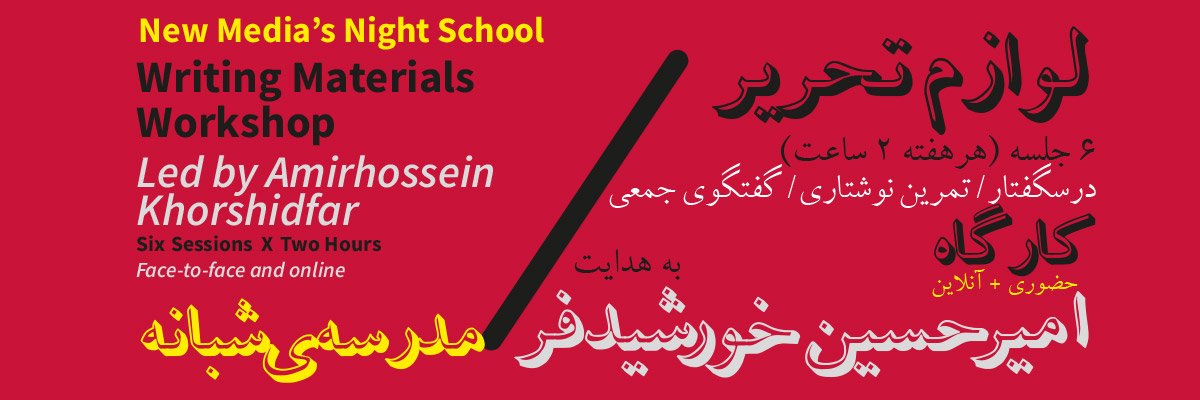
Led by Amirhossein Khorshidfar
Duration: 12 hours, six sessions
Face-to-face and online (Zoom platform)
Aug and Sep 2022
About Amirhossein Khorshidfar
Amirhossein Khorshidfar (b.Tehran-1981) is an award-winning Iranian writer, literary critic, and journalist. He is best known for his short story collection Life Goes on According to Your Will( 2006).
He graduated with a B.A. degree from the University of Art and Architecture in Tehran in industrial design. Still, he did not pursue this field after graduation.
In 2001, Khorshidfar published four children’s books with Mohammadali Baniasadi as one of the illustrators: The First Days on Earth, The Day the Sky Broke, The Boy Who Had No Star, and The Rain Story.
The following year, his short story “Neighbor” was selected for Sadegh Hedayat literary award. His
short story collection “Life Goes on According to Your Will” was published in 2006. This collection, including ten short stories, won the most prominent literary awards and was nominated for the best literary fiction of the year. It was selected as the best short story collection of the decade in opinion polls from Iranian authors and critics held by Hamshahri newspaper and Chelcheragh weekly magazine.
In 2009, Khorshidfar rewrote and published Shahab al-Din Suhrawardi’s Stories. Amirhossein khorshidfar has been a jury member of both Roozirozegar and Golshiri literary awards from 2008 to 2011.
Khorshidfar worked as a literary editor in the Ofoq publication from 2010 to 2013. During this period, Ofoq’s publication won the national award for the best foreign literary book and best Persian story collection for the first time since its foundation.
He also pursued a career in journalism in established Iranian reformist newspapers such as Bahar, Shargh, Etemad, and Roozegar from 2006 to 2015. He was the editor of the 47th volume of Nafe literary magazine. He published a series of articles on the presence of urban spaces in the work of Iranian authors in the Cinema and Literature Magazine.
In recent years Khorshidfar has held several literary courses, including “How Fiction is Made,” “Modernism in European Novels,” “20th-century Novels”, “How to Enjoy Literature,” “Novella,” and “Persian Fiction Forms.” He has also been a lecturer for short literary courses at Tehran University.
In 2017, in collaboration with Bahar Ahmadi Fard, he translated the novel “Loitering with Intent” by Muriel Spark into Persian.
In the same year, His first novel “Tehraniha” and his short story collection, “Betting on a Race Horse and Other Short Stories,” were published. “Tehraniha” was republished three times in a short period.
Currently, he is working on two other novels and a book on the spatial relationship between literature and the city.
Workshop Outline:
You might have worked with various media in your projects as professional artists, but you somehow face the dilemma of archiving your works, and like many artists, you keep track of your projects.
Working with video/moving images as a medium or not, we will investigate how you have encountered these in your previous projects, researching your existing portfolios or your personal history. In the workshop, we will try to track down traces by selecting & redefining your current approach toward moving images, time-based media, or expanded media installations. Are we working the same as before? How can we imagine ways and configurations for translating our existing projects into alternative contexts and spaces?
What will happen if we stop producing “new” images and look collectively in our storage boxes, dark corners of our hard drives, and our online footprints for recovering, recycling, and re-articulating, stored /distorted/missing imaginaries? What subjects, policies, and context will emerge to bring about, discuss and share with others?
The workshop aims to develop an interdisciplinary and collective experience; with participants’ contributions in the visual arts, performance, literary and sound art. Accordingly, the proper context for defining the possible works to be completed during the workshop can range from merely visual works to participatory or social/documentary projects.